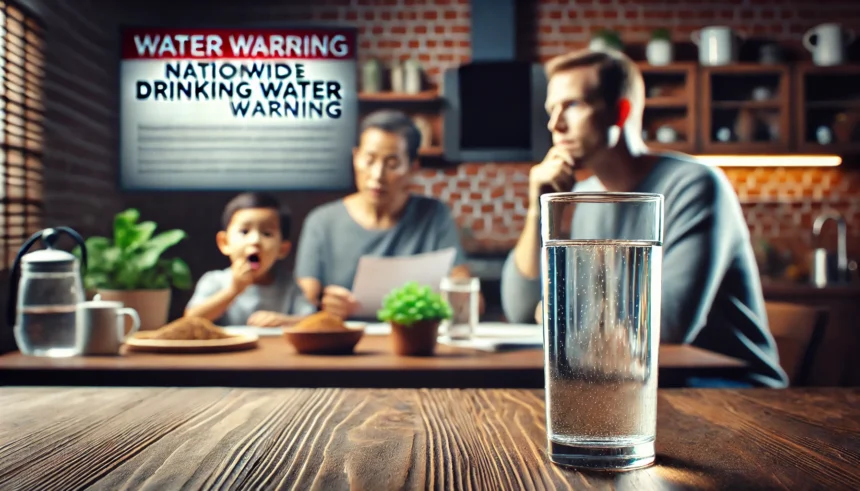The recent drinking water warning issued nationwide has raised concerns across the country. Authorities urge all residents to be cautious about their water consumption, as potential contaminants have been detected. This warning highlights the importance of staying informed and taking proactive measures to ensure the safety of your drinking water. Here’s what you need to know to protect yourself and your family.
Introduction
In a startling development, a drinking water warning issued nationwide has sparked widespread concern and prompted immediate action from both government agencies and citizens. This article delves into the reasons behind the warning, the potential health risks, and the steps you can take to safeguard your drinking water. With water being an essential element of daily life, understanding the severity of the situation is crucial for maintaining your health and well-being.
The Cause of the Drinking Water Warning Issued Nationwide
Understanding the cause of the drinking water warning issued nationwide is the first step in addressing the issue. Recent tests have revealed the presence of harmful contaminants in several water supplies across the country. These contaminants, which include bacteria, chemicals, and heavy metals, have the potential to cause serious health problems if consumed.
- Bacterial Contamination: Bacteria such as E. coli and coliforms have been found in water sources, posing a significant risk of gastrointestinal illnesses. These bacteria can enter water supplies through various means, including sewage leaks, agricultural runoff, and improper waste disposal.
- Chemical Contaminants: Industrial chemicals, pesticides, and pharmaceutical residues are increasingly being detected in water supplies. These substances can have long-term health effects, including hormone disruption, cancer, and other chronic diseases.
- Heavy Metals: Lead, mercury, and arsenic are among the heavy metals that have been found in drinking water. These metals are particularly dangerous because they can accumulate in the body over time, leading to neurological and developmental disorders.
Health Risks Associated with Contaminated Drinking Water
The health risks associated with contaminated drinking water are vast and varied. Depending on the type and concentration of contaminants, individuals may experience immediate symptoms or develop chronic health conditions over time.
- Short-Term Effects: Acute exposure to contaminated water can cause symptoms such as nausea, vomiting, diarrhea, and abdominal pain. In severe cases, it may lead to dehydration, fever, and even hospitalization.
- Long-Term Effects: Prolonged consumption of contaminated water can result in more serious health issues. For instance, long-term exposure to lead can cause developmental delays in children, while ongoing ingestion of chemical contaminants may increase the risk of cancer and other life-threatening conditions.
- Vulnerable Populations: Certain groups, including infants, pregnant women, the elderly, and individuals with compromised immune systems, are more susceptible to the adverse effects of contaminated water. Extra precautions should be taken to ensure the safety of these populations.
Steps to Protect Your Drinking Water
In light of the drinking water warning issued nationwide, it is essential to take immediate action to protect your drinking water and ensure it is safe for consumption. Here are some practical steps you can take:
- Use a Water Filter: Investing in a high-quality water filter can help remove many contaminants from your tap water. Look for filters that are certified to remove bacteria, chemicals, and heavy metals.
- Boil Your Water: Boiling water is an effective way to kill bacteria and other pathogens. Bring water to a rolling boil for at least one minute before using it for drinking, cooking, or brushing your teeth.
- Check Your Water Source: If you have a private well, it is crucial to have it tested regularly for contaminants. Public water supply users should stay informed about local water quality reports and any advisories issued by their water provider.
- Avoid Bottled Water: While bottled water may seem like a safe alternative, it is not always the best option. Some bottled water brands are simply repackaged tap water, and the plastic bottles can leach harmful chemicals into the water.
- Stay Informed: Keep up with news and updates from local and national health authorities regarding the status of the drinking water warning issued nationwide. This information will help you make informed decisions about your water consumption.
Government Response and Public Reaction
The drinking water warning issued nationwide has prompted a swift response from government agencies at all levels. The Environmental Protection Agency (EPA) and the Centers for Disease Control and Prevention (CDC) are working together to investigate the source of the contamination and develop strategies to mitigate the risks.
- Federal Initiatives: The federal government is increasing funding for water infrastructure improvements, including the replacement of aging pipes and the installation of advanced water treatment systems. Additionally, new regulations are being considered to limit the discharge of harmful chemicals into water sources.
- State and Local Efforts: State and local governments are also taking action by issuing boil water advisories, distributing water filters to affected communities, and conducting widespread water testing. Public awareness campaigns are being launched to educate citizens about the importance of water safety.
- Public Concerns: The warning has understandably caused anxiety among the public. Many people are concerned about the long-term implications for their health and the safety of their families. Community meetings and public forums are being held to address these concerns and provide guidance on how to navigate the situation.
The Importance of Water Safety in Daily Life
Water safety is an issue that extends beyond the current warning. Even after the immediate threat has passed, it is essential to remain vigilant about the quality of your drinking water. Regular testing, proper filtration, and staying informed about potential contaminants are key to ensuring that the water you consume is safe.
- Environmental Impact: The contamination of water sources highlights the broader issue of environmental pollution. Industrial activities, agricultural practices, and inadequate waste management contribute to the degradation of water quality. Addressing these root causes is vital for preventing future water safety crises.
- Personal Responsibility: While government agencies play a significant role in ensuring water safety, individuals also have a responsibility to protect their own health. This includes being proactive about water testing, using filters, and staying informed about potential risks.
- Future Challenges: As climate change and population growth put additional strain on water resources, the challenges of maintaining clean and safe drinking water will only increase. It is crucial to prioritize water safety as a public health issue and invest in sustainable solutions.
Conclusion
The drinking water warning issued nationwide serves as a stark reminder of the importance of water safety. With potential contaminants posing serious health risks, it is essential to take proactive measures to protect yourself and your family. By staying informed, using appropriate filtration methods, and advocating for stronger environmental protections, we can all contribute to ensuring the safety of our drinking water now and in the future.
For More Visit, Viraltimes.co.uk







